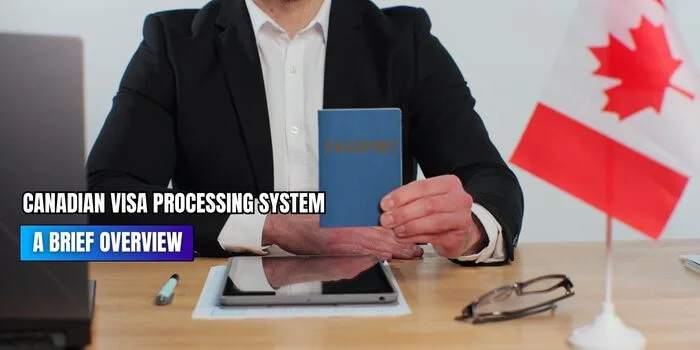International travel often raises questions about visa procedures, particularly when it comes to rejections. There is a common question we hear from our clients, “Is Canada conference visa rejection stamped on passport?” Let’s put your worries to rest right away.
No, Canada opts for a more private approach to visa denials. Instead of marking your passport with a stamp of rejection, applicants receive a detailed refusal letter. This letter outlines the reasons behind the decision, making sure your passport stays stamp-free and your privacy is protected.
Interested in how this might affect your travel plans in the future? Stick around as we dive deeper into this topic throughout the rest of our article.
Canadian Visa Processing System: A Brief Overview
The Canadian visa processing system is designed to be thorough yet straightforward. Whether you’re applying for a visitor, conference, or work visa, the process follows a series of clear steps. First, you’ll need to gather essential documents, such as your passport, proof of funds, and an invitation letter if attending a conference.
Next, submit your application either online or at a local Visa Application Center (VAC). After submission, you may be asked to provide biometrics—fingerprints and a photograph—to further verify your identity. The visa application fee will also need to be paid at this stage.
If a visa application is refused, the biometrics fee is not refunded. However, once biometrics are given, they usually remain valid for future Canadian visa applications for several years, so applicants do not need to pay the biometrics fee again when reapplying during that validity period.
The processing time varies depending on your location and visa type, but checking the status online ensures you’re informed throughout the process. A final decision is communicated via email, and if approved, you’ll receive your visa electronically or affixed to your passport, depending on your application method.
What are the Reasons for Canadian Conference Visa Rejections?
Visa rejections are disheartening, especially when you are eager to explore Canada’s vast landscapes. Knowing the common reasons behind these decisions can help you prepare for reapplication. Here are some specific reasons why your Canadian conference visa application might be denied.
Incomplete Documentation
A common hiccup in the process is submitting an application with missing documents. This oversight can delay or derail your plans significantly. Ensure every required paper is in order, including forms and identification. Double-checking your submission for completeness is crucial.
Insufficient Financial Resources
Officials need assurance that you can financially sustain yourself during your stay. Lack of evidence regarding funds can raise concerns about your visit. For example, attending an International Conference in Canada 2024 would require showing bank statements or financial documents as proof of your ability to cover expenses.
Unclear Purpose of Visit
If the visa officers are unclear about why you want to visit, it might lead to rejection. A well-defined itinerary or invitation letter can mitigate this issue. These documents should detail your plans and reasons for visiting. Clarity in your application is key to its success.
Doubts about Returning Home
The embassy looks for strong ties to your home country. Job, family, and property can all serve as evidence of your intent to return. Without such ties, the fear of overstaying becomes a legitimate concern. It’s essential to demonstrate your rootedness in your homeland.
Criminal History
A past criminal record can significantly hinder your visa application. Canada is stringent about allowing entry to individuals with a criminal background. Even minor infractions can be viewed unfavorably. It’s important to be transparent and provide necessary explanations or documentation.
Health Concerns
Canada may deny visas due to health reasons, especially if it poses a public health risk. A mandatory medical exam for long stays can uncover issues. Vaccination records and health assessments are part of the evaluation. Ensuring you meet health standards is necessary for approval.
By addressing these common reasons for rejection, applicants can increase their chances of a successful visa application. Remember, preparation and clarity are your best allies on this journey.
Is Canada Conference Visa Rejection Stamped on Passport?
No, Canada does not stamp or mark passports when a conference visa application is rejected. If you’re wondering, “Is Canada Conference Visa Rejection Stamped on Passport?”, the clear answer is no. Instead, applicants receive a detailed refusal letter explaining the reason for their rejection. This approach maintains the security of the applicant’s passport and ensures privacy.
While Canada does not stamp passports after a visa refusal, the decision is recorded digitally in IRCC’s system under the applicant’s unique client profile. Visa officers can see this history during future applications, even though the passport itself remains clean and unmarked.
Here is a Detailed explanation of is Canada conference visa rejection stamped on the Passport.
Refusal Letter
When a Canadian conference visa application is rejected, applicants are notified through a refusal letter rather than a passport stamp. This letter outlines the specific reasons for the denial, providing clarity on why the application was unsuccessful.
The refusal letter serves as an official document that applicants can keep for their records. It allows them to understand what went wrong and address any issues if they choose to reapply. This transparent approach helps applicants plan their next steps more effectively.
By not stamping the passport, Canada ensures the applicant’s privacy and protects their future travel opportunities. This method respects their plans without causing unnecessary complications when applying for visas to other countries.
Privacy Concerns
Canada’s visa policy emphasizes protecting the privacy of applicants. Rather than stamping a passport with a refusal, the decision is communicated through a detailed letter. This ensures that the applicant’s travel history remains private, minimizing any potential impact on future visa applications.
A refusal stamp in a passport could lead to issues when applying for visas in other countries, as it may raise unnecessary questions. By not marking the passport, Canada allows individuals to reapply without carrying the burden of visible rejection on their documents.
This approach ensures that the passport remains a neutral travel document. It reflects Canada’s commitment to safeguarding personal information while maintaining fairness in the visa process for everyone.
Reapplication Process
When a Canadian conference visa is rejected, the refusal letter plays a vital role in guiding your next steps. This letter outlines the specific reasons for the rejection, helping you understand what went wrong and what you need to improve for future applications.
In recent application cycles, refusal letters may include a brief summary of the visa officer’s decision notes. This allows applicants to understand the specific reasons for refusal without requesting GCMS notes separately, helping them address issues clearly before submitting a new application.
For example, if Canada visa rejection due to family ties was one of the reasons, the letter would highlight this, allowing you to better address those concerns by providing stronger evidence of your intent to return home. This feedback loop is designed to give you a better chance of success the next time you apply.
It’s important to address the issues raised in the letter thoroughly before reapplying. Doing so demonstrates that you’ve taken the concerns seriously and are better prepared to meet the visa requirements.
Future Travel
A visa refusal from Canada does not mean your travel prospects are permanently affected. One key aspect is that the refusal is not stamped on your passport, making it easier for you to reapply in the future. You can take steps to address the reasons for the rejection and try again.
Additionally, a Canadian visa refusal doesn’t impact your ability to apply for visas to other countries. Your global mobility remains unaffected, and you can continue to travel internationally as long as you meet the requirements for those destinations.
This policy ensures that applicants can move forward without lasting consequences. If you correct the issues that led to the refusal, there’s a good chance future applications to Canada will be successful.
Administrative Efficiency
The Canadian visa process is designed for administrative efficiency, benefiting both applicants and visa officers. By not marking passports, the process becomes smoother and faster, reducing the need for physical handling and paperwork.
Instead of relying on physical stamps, visa refusals are recorded digitally, which enhances both efficiency and security. This approach allows Canadian visa officers to focus on more critical aspects of the application, minimizing delays and human error.
For applicants, this system is more convenient, as their passport remains untouched, and they receive detailed information about their rejection through a secure, private channel. The shift toward digital documentation helps streamline the overall process and ensures that important decisions are well-documented and easily accessible.
By opting for refusal letters over passport stamps, Canada maintains the dignity of the application process and supports applicants in their future endeavors.
Requirements for Canadian Visa Approval
A clear understanding of the requirements is necessary to obtain a visa for Canada. Each requirement plays an important role in the approval process. Here’s what applicants need to know to make their journey successful.
- A valid passport is essential for travel to Canada. It must have at least one blank page for stamps that aren’t related to visa refusals.
- Applicants must provide proof of sufficient funds. This shows they can cover their stay and any expenses without issue.
- A letter of invitation from someone in Canada can support your application. It’s not mandatory but highly recommended for clarity on your visit’s purpose.
- Proof of ties to your home country ensures the consulate of your intent to return. This can include job contracts, property deeds, or family obligations.
- A clean criminal record is a non-negotiable aspect. Authorities require a police certificate to attest to your good standing.
- Applicants may need to undergo a medical exam. This is especially true if you plan to stay for an extended period or work in certain sectors.
Following these instructions closely increases your chances of a favorable outcome, opening doors to the diverse and welcoming landscape of Canada.
How to Check Your Visa Status?
The status of your visa application is an important factor when planning your trip. In most countries, online platforms make this process easy. Here are the steps you need to follow to check your visa status.
Step 1: Visit the Official Visa Application Website
Start by clicking on the official website of the embassy or consulate where you submitted your visa application. This site often has a dedicated section for visa inquiries. Ensure you’re on the correct website to avoid any scams or misinformation. These platforms are designed for user-friendly navigation.
Step 2: Locate the Visa Status Check Section
Once on the official site, look for the visa status check or application tracking section. This might be listed under various names such as “Track Your Application” or “Visa Status.” Each website has its unique layout, so keep an eye out for these terms. This section is specifically designed for applicants to get updates.
Step 3: Enter Your Application Details
You will be prompted to enter specific details about your application. This usually includes your application ID, passport number, or a combination of personal information. Make sure to have your documents handy to enter this information accurately. It’s crucial for accessing your specific visa application status.
Step 4: Review Your Visa Status
After submitting your details, your visa application status should be displayed on the screen. This status can range from “received,” “in process,” to “decided.” If your application is still under review, it’s important to check back regularly. Some systems also offer email notifications for status updates.
By following these steps, you can monitor the progress of your application and plan your travel accordingly. Remember, patience is key, as processing times can vary depending on the type of visa and the specific country.
Tips for a Successful Canada Conference Visa Application After Rejection
Rejection of a Canada conference visa can be disheartening, but it is not the end of the road. It allows you to reassess and strengthen your application for your next application. Here are practical tips to enhance your chances of success on your next application.
- Review the refusal letter closely to understand the reasons behind the rejection. Address these issues directly in your new application to improve your chances. If you’re concerned about the impact of Canada conference visa refusal on US visa applications, it’s generally not a direct factor but should be approached with care.
- Strengthen your ties to your home country by providing evidence such as employment, family, or property ownership. This demonstrates your intention to return after the conference.
- Enhance your financial documentation to show sufficient funds for your stay. Bank statements or sponsor letters can clarify your financial stability.
- Obtain a more detailed conference invitation letter from the conference organizers. Ensure it outlines your role, the event’s importance, and why your attendance is vital.
- If unclear purpose was an issue, clarify the objectives of your visit. Explain how attending the conference benefits your professional development or academic research.
- Consider a consultation with an immigration expert or lawyer. Professional advice can provide insights and strategies for a successful reapplication.
When officer decision notes are provided, use them as a direct guide for your reapplication. Each note usually highlights a specific concern, such as dual intent, weak home-country ties, or an unclear purpose of travel. Your new application should directly address that concern with stronger evidence rather than repeating the same documents.
Frequently Asked Questions
Here are some of the FAQs and their relevant answers for a clear concept about is Canada conference visa rejection stamped on a passport.
Can a Canada Conference Visa Rejection Affect Future Visa Applications?
Yes, repeated rejections can hurt future visa applications, as they may indicate a pattern of ineligibility or suspicion.
Is There an Appeal Process Available if My Canada Conference Visa Is Rejected?
Yes, there is an option to appeal the decision if you believe there was an error or misunderstanding. However, it’s crucial to review the specific guidelines and deadlines for the appeal process.
Will I Receive a Detailed Explanation for The Rejection of My Canada Conference Visa?
While visa officers provide reasons for rejections when possible, the level of detail can vary. Applicants can request additional information through the appropriate channels if necessary.
Can I Re-apply Immediately After a Canada Conference Visa Rejection?
Yes, there’s no specific waiting period required before reapplying. However, it’s essential to address any issues or concerns raised in the rejection to improve the chances of approval.
Does a Canada Conference Visa Rejection Affect My Eligibility for Other Types of Visas, Such as Tourist or Business Visas?
While each visa application is assessed independently, a history of rejections may influence the overall assessment of an applicant’s credibility and intentions for visiting Canada. It’s advisable to address any underlying issues to enhance the likelihood of success in future applications.
Conclusion
The exploration into whether Canada stamps passports after a conference visa rejection has revealed a thoughtful approach by Canadian authorities. They prioritize applicant privacy by issuing detailed refusal letters instead of passport stamps, preserving the passport’s cleanliness for future use.
In addressing the query, is Canada conference visa rejection stamped on passport, we’ve learned that Canada’s method ensures that applicants’ travel histories remain spotless. This facilitates easier reapplication and minimizes complications in future international travel endeavors.
Furthermore, our discussion highlighted effective strategies for strengthening one’s visa application, emphasizing the importance of clear documentation and solid ties to one’s home country. This guidance aims to equip applicants with the knowledge to enhance their prospects for a successful visa application to Canada.








